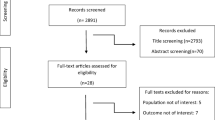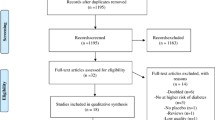Abstract
It is well documented that selenium (Se) is involved in the metabolism of glucose. However, whether Se supplementation could lower the risk of type 2 diabetes mellitus (T2DM) remains elusive. We aimed to evaluate the association between Se supplementation and the risk of T2DM by performing a meta-analysis. We searched the Pubmed, Embase, and Cochrane databases from January 1990 to November 2013 to identify randomized controlled trials (RCTs) that met pre-stated inclusion criteria. Reference lists of retrieved articles were also reviewed. Either a fixed-effects or, in the presence of heterogeneity, a random-effects model was used to calculate the pooled prevention effects. Four RCTs involving 20,294 participants were included in this meta-analysis. The combined relative risks (RRs) for subjects administered with Se compared with control groups were 1.09 (95 % CI: 0.99–1.20, p = 0.085). Omission of any single study did not change the overall risk estimates significantly. Meta- regression analyses showed almost no impact on the RRs of age and study length. No evidence of publication bias was observed. In conclusion, our findings do not support the routine application of Se supplementation for T2DM prevention in Caucasians. Larger studies are needed to investigate the effects of Se supplementation on T2DM prevention among various populations and further elucidate the impact of age and study length.



Similar content being viewed by others
References
N. Jafari, Z. Farajzadegan, A. Loghmani, M. Majlesi, N. Jafari, Spiritual well-being and quality of life of Iranian adults with type 2 diabetes. Evid. Based Complement. Altern. Med. 2014, 619028 (2014)
P. Zimmet, K.G. Alberti, J. Shaw, Global and societal implications of the diabetes epidemic. Nature 414, 782–787 (2001)
K. Imam, Management and treatment of diabetes mellitus. Adv. Exp. Med. Biol. 771, 356–380 (2012)
A. Ceriello, E. Motz, Is oxidative stress the pathogenic mechanism underlying insulin resistance, diabetes, and cardiovascular disease? The common soil hypothesis revisited. Arterioscler. Thromb. Vasc. Biol. 24, 816–823 (2004)
Y. Xia, K.E. Hill, D.W. Byrne, J. Xu, R.F. Burk, Effectiveness of selenium supplements in a low-selenium area of China. Am. J. Clin. Nutr. 81, 829–834 (2005)
Z.W. Liu, H.T. Zhu, K.L. Chen, C. Qiu, K.F. Tang, X.L. Niu, Selenium attenuates high glucose-induced ROS/TLR-4 involved apoptosis of rat cardiomyocyte. Biol. Trace Elem. Res. 156, 262–270 (2013)
A.S. Müller, E. Most, J. Pallauf, Effects of a supranutritional dose of selenate compared with selenite on insulin sensitivity in type II diabetic dbdb mice. J. Anim. Physiol. Anim. Nutr. (Berl) 89, 94–104 (2005)
J. Zhou, K. Huang, X.G. Lei, Selenium and diabetes—evidence from animal studies. Free Radic. Biol. Med. 584, 343–352 (2013)
M.S. Zeng, X. Li, Y. Liu, H. Zhao, J.C. Zhou, K. Li, J.Q. Huang, L.H. Sun, J.Y. Tang, X.J. Xia, K.N. Wang, X.G. Lei, A high-selenium diet induces insulin resistance in gestating rats and their offspring. Free Radic. Biol. Med. 52, 1335–1342 (2012)
C. Kornhauser, J.R. Garcia-Ramirez, K. Wrobel, E.L. Pérez-Luque, M.E. Garay-Sevilla, K. Wrobel, Serum selenium and glutathione peroxidase concentrations in type 2 diabetes mellitus patients. Prim. Care Diabetes 2, 81–85 (2008)
S. Stranges, J.R. Marshall, R. Natarajan, R.P. Donahue, M. Trevisan, G.F. Combs, F.P. Cappuccio, A. Ceriello, M.E. Reid, Effects of long-term selenium supplementation on the incidence of type 2 diabetes: a randomized trial. Ann. Intern. Med. 147, 217–223 (2007)
H. Misu, T. Takamura, H. Takayama, H. Hayashi, N. Matsuzawa-Nagata, S. Kurita, K. Ishikura, H. Ando, Y. Takeshita, T. Ota, M. Sakurai, T. Yamashita, E. Mizukoshi, T. Yamashita, M. Honda, K. Miyamoto, T. Kubota, N. Kubota, T. Kadowaki, H.J. Kim, I.K. Lee, Y. Minokoshi, Y. Saito, K. Takahashi, Y. Yamada, N. Takakura, S. Kaneko, A liver-derived secretory protein, selenoprotein P, causes insulin resistance. Cell Metab. 12, 483–495 (2010)
A.M. Algotar, M.S. Stratton, S.P. Stratton, C.H. Hsu, F.R. Ahmann, No effect of selenium supplementation on serum glucose levels in men with prostate cancer. Am. J. Med. 123, 765–768 (2010)
E.A. Klein, I.M. Thompson Jr, C.M. Tangen, J.J. Crowley, M.S. Lucia, P.J. Goodman, L.M. Minasian, L.G. Ford, H.L. Parnes, J.M. Gaziano, D.D. Karp, M.M. Lieber, P.J. Walther, L. Klotz, J.K. Parsons, J.L. Chin, A.K. Darke, S.M. Lippman, G.E. Goodman, F.L. Meyskens Jr, L.H. Baker, Vitamin E and the risk of prostate cancer: the selenium and vitamin E cancer prevention trial (SELECT). JAMA 306, 1549–1556 (2011)
D.D. Karp, S.J. Lee, S.M. Keller, G.S. Wright, S. Aisner, S.A. Belinsky, D.H. Johnson, M.R. Johnston, G. Goodman, G. Clamon, G. Okawara, R. Marks, E. Frechette, W. McCaskill-Stevens, S.M. Lippman, J. Ruckdeschel, F.R. Khuri, Randomized, double-blind, placebo-controlled, phase III chemoprevention trial of selenium supplementation in patients with resected stage I non-small-cell lung cancer: ECOG 5597. J. Clin. Oncol. 31, 4179–4187 (2013)
M.P. Rayman, S. Stranges, Epidemiology of selenium and type 2 diabetes: can we make sense of it? Free Radic. Biol. Med. 65, 1557–1564 (2013)
D. Moher, A. Liberati, J. Tetzlaff, D.G. Altman, PRISMA Group, preferred reporting items for systematic reviews and meta-analyses: the PRISMA statement. Int. J. Surg. 8, 336–341 (2010)
C.M. da Costa Santos, C.A. de Mattos Pimenta, M.R. Nobre, The PICO strategy for the research question construction and evidence search. Rev. Lat. Am. Enfermagem 15, 508–511 (2007)
L.V. Papp, A. Holmgren, K.K. Khanna, Selenium and selenoproteins in health and disease. Antioxid. Redox Signal. 12, 793–795 (2010)
S.R. Stapleton, Selenium: an insulin-mimetic. Cell. Mol. Life Sci. 57, 1874–1879 (2000)
H. Misu, T. Takamura, H. Takayama, H. Hayashi, N. Matsuzawa-Nagata, S. Kurita, K. Ishikura, H. Ando, Y. Takeshita, T. Ota, M. Sakurai, T. Yamashita, E. Mizukoshi, T. Yamashita, M. Honda, K. Miyamoto, T. Kubota, N. Kubota, T. Kadowaki, H.J. Kim, I.K. Lee, Y. Minokoshi, Y. Saito, K. Takahashi, Y. Yamada, N. Takakura, S. Kaneko, A liver-derived secretory protein, selenoprotein P, causes insulin resistance. Cell Metab. 12, 483–495 (2010)
T.N. Akbaraly, J. Arnaud, M.P. Rayman, I. Hininger-Favier, A.M. Roussel, C. Berr, A. Fontbonne, Plasma selenium and risk of dysglycemia in an elderly French population: results from the prospective Epidemiology of Vascular Ageing Study. Nutr. Metab. (Lond) 7, 21 (2010)
X. Yan, M.P. Pepper, M.Z. Vatamaniuk, C.A. Roneker, L. Li, X.G. Lei, Dietary selenium deficiency partially rescues type 2 diabetes-like phenotypes of glutathione peroxidase-1- overexpressing male mice. J. Nutr. 142, 1975–1982 (2012)
M.P. Rayman, G. Blundell-Pound, R. Pastor-Barriuso, E. Guallar, H. Steinbrenner, S. Stranges, A randomized trial of selenium supplementation and risk of type-2 diabetes, as assessed by plasma adiponectin. PLoS One 7, e45269 (2012)
X.M. Luo, H.J. Wei, C.L. Yang, J. Xing, X. Liu, C.H. Qiao, Y.M. Feng, J. Liu, Y.X. Liu, Q. Wu, Bioavailability of selenium to residents in a low-selenium area of China. Am. J. Clin. Nutr. 42, 439–448 (1985)
Y. Xia, Y. Zhao, X. Zhao, L. Zhu, P.D. Whanger, Metabolism of selenate and selenomethionine by a selenium-deficient population of men in China. J. Nutr. 3, 202–210 (1992)
G. Forte, B. Bocca, A. Peruzzu, F. Tolu, Y. Asara, C. Farace, R. Oggiano, R. Madeddu, Blood metals concentration in type 1 and type 2 diabetics. Biol. Trace Elem. Res. 156, 79–90 (2013)
S. Praveena, S. Pasula, K. Sameera, Trace elements in diabetes mellitus. J. Clin. Diagn. Res. 7, 1863–1865 (2013)
Acknowledgments
This study was supported by Grants from the National Basic Research Program of China 973 Program (Nos. 2012CB517602 and 2013 CB 530604), the National Natural Science Foundation of China (Nos. 81170635 and 81270785) and the Research and innovation Project for College Graduates of Jiangsu Province, China (Grant number CXLX13_556).
Conflict of interest
There is no conflict of interest for all authors.
Author information
Authors and Affiliations
Corresponding author
Electronic supplementary material
Below is the link to the electronic supplementary material.
Rights and permissions
About this article
Cite this article
Mao, S., Zhang, A. & Huang, S. Selenium supplementation and the risk of type 2 diabetes mellitus: a meta-analysis of randomized controlled trials. Endocrine 47, 758–763 (2014). https://doi.org/10.1007/s12020-014-0298-7
Received:
Accepted:
Published:
Issue Date:
DOI: https://doi.org/10.1007/s12020-014-0298-7




